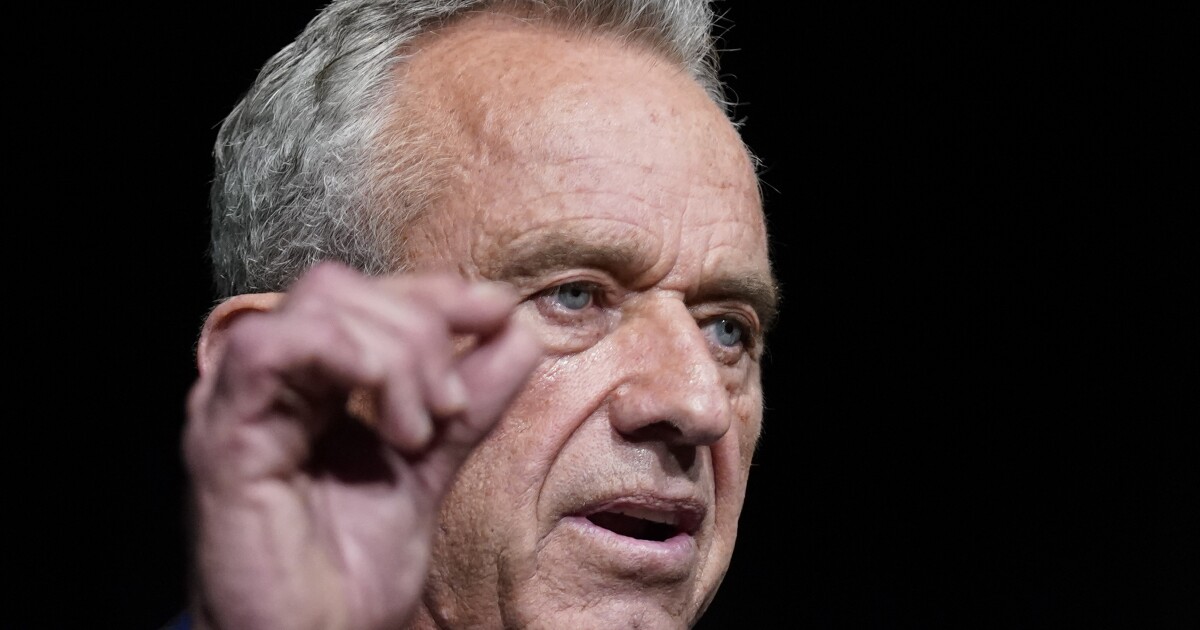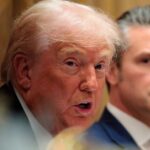

EXCLUSIVE — Robert F. Kennedy Jr. said he aims to overhaul the National Institutes of Health unilaterally to address the high prevalence of chronic disease, criticizing his opponents in the 2024 presidential campaign as maintaining a status quo that benefits pharmaceutical companies.
Kennedy, who has long clashed with the public health establishment over vaccines and other matters, told the Washington Examiner in an exclusive interview that he will redirect the $42 billion in research funds for the NIH away from what he calls the “mercantile interests of the pharmaceutical industry.”
BIDEN SHIFTS FOCUS AWAY FROM DOMESTIC AFFAIRS AS ISRAEL WAR INTENSIFIES
“In my first week in office, I’m going to assemble the upper echelon of the NIH, and we’re going to redirect [our] research funding,” Kennedy said. “We’re going to find out what is making our kids the sickest generation in history.”
Kennedy said he primarily wants to target neurological disorders diagnosed during childhood, including autism spectrum disorders, ADHD, and learning disabilities. He also said he is concerned by autoimmune conditions, such as rheumatoid arthritis, Type 1 diabetes, Crohn’s disease, lupus, and multiple sclerosis.
Kennedy cited data from the Centers for Disease Control and Prevention that one in every 36 children could be diagnosed with an autism spectrum disorder as of 2020, while it was only one in 150 in 2000. Kennedy also pointed to data from the Environmental Protection Agency finding increases in neurodevelopmental conditions, such as autism, learning disabilities, attention disorders, and intellectual disabilities, since the 1990s.
Most health experts say the apparent rise in such conditions is attributable primarily to changes in diagnostic criteria for neurodevelopmental disorders as well as improved access to screening beginning in the late 1980s.
There is also wide agreement that there is no connection between autism and vaccination. But Kennedy has come under significant criticism for his assertion that childhood vaccines are causally related to the increasing prevalence of autism, most famously in his 2005 article “Deadly Immunity.” In 2007, Kennedy founded Children’s Health Defense, a nonprofit organization highly critical of vaccinations as well as environmental exposure to toxic chemicals for their supposed common link to neurological and autoimmune chronic conditions.
The son of the late Attorney General Robert F. Kennedy and nephew of President John F. Kennedy gained notoriety as well as a stronger political following during the coronavirus pandemic for criticizing mRNA vaccines, vaccine mandates, and the speed with which COVID-19 vaccines entered the market. His comments about vaccines led to bans from several social media platforms and condemnation from family members.
“Genes don’t cause epidemics,” Kennedy told the Washington Examiner. “They can provide vulnerabilities, but you need environmental toxins.”
Kennedy told the Washington Examiner that there are “probably under 20 [environmental] culprits” that he would instruct the NIH to prioritize in its investigation — ranging from pesticides and fertilizers to flame retardant chemicals in toys and children’s clothes.
“Unfortunately, we have public health agencies that are unwilling to look at the etiology of these chronic diseases,” Kennedy said. “We need better science … to identify the culprit, and we need to eliminate the exposure.”
Kennedy said Republicans and Democrats alike have allowed the public health bureaucracy to profit from the development of research emphasizing treatments and vaccines for infectious diseases rather than finding the root causes of chronic disorders. He said the NIH has perpetuated a cycle of “developing new drugs, incubating new drugs, and then splitting the royalties with pharma.”
Kennedy said he would expeditiously override health officials who might be opposed to changes in research priorities.
“I’ll do it overnight,” he said. “I know I can order the NIH what to fund and what not to. It’s not statutory. These are policy decisions that are made by individual bureaucrats who work for the president. They’re all in the executive branch.”
CLICK HERE TO READ MORE FROM THE WASHINGTON EXAMINER
Kennedy also said that on day one in the Oval Office, he would prohibit television advertising for pharmaceutical products to curb the influence of the industry. The United States and New Zealand are the only countries that allow direct-to-consumer advertising for prescription drugs.
“The key priority right now for American healthcare is eliminating chronic disease, and that’s what it will be under my administration,” Kennedy said.





